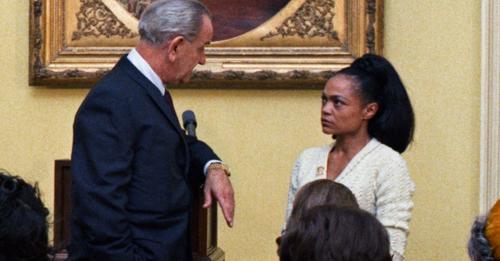-
Posts
3,954 -
Joined
-
Last visited
-
Days Won
120
richardmurray's Achievements
Single Status Update
See all updates by richardmurray
-

The Black Individual in the USA isn't best for the Black community in the USA, but is best for the Individualist culture in the USA to survive and grow beyond the USA's government bounds.
ARTICLE
When Eartha Kitt Disrupted the Ladies Who Lunch
Scott Calonico’s documentary short “Catwoman vs. the White House” reconstructs an unexpected moment of activism during the Vietnam War.
Film by Scott Calonico
Text by Lauren Elyse Garcia
February 16, 2022
Eartha Kitt didn’t want to attend the White House luncheon that wound up derailing her career: the 1968 Women Doers Luncheon, the First Lady Claudia (Lady Bird) Johnson called it. The topic of interest would be delinquency in the streets. Kitt didn’t put much stock in the gathering. “Those luncheons—what are they gonna mean?” she remembered thinking. “Blah-blah-blah-blah-blah, and that’s it.”
Kitt, in fact, had crashed a luncheon roughly a month earlier, playing Catwoman in an episode of “Batman,” the campy, Skittles-hued series that punctuated its punches with “Bam!”s, “Whack!”s, and family-friendly messages about how crime isn’t groovy. At the fictional luncheon—a celebration of Batgirl, Gotham City’s declared best-dressed woman—the ladies who lunch, coiffed and hatted, politely clap as they sit in front of tables that hardly have any lunch on them. Holy yawn fest, Batman. When Kitt as Catwoman interrupts the affair, her skintight, shimmery noir catsuit is a titillating, sharp gasp against all that dull prettiness. “How can Batgirl be the best anything when Catwoman is around?” she says, with a sensual smirk. In her embodiment of Catwoman, her musculature moves in prowls; her vibrato is translated into purrs; she’s PG-rated sex. It’s the kind of immortally slinky performance that gets mass-produced in polyester every Halloween. Kitt was one of the rare Black female performers to make it to prime time, and she was glorious in the television’s glow. But at Lady Bird’s luncheon Kitt earned herself another kind of fame.
At that event, in front of another room full of polite ladies with coiffed hairdos and hats, Kitt spoke out against the Vietnam War. The war was in its thirteenth year and under its third sitting U.S. President with Lyndon B. Johnson, and the mood of the nation’s youth about his Vietnam policy may best be encapsulated by the chant “Hey, hey, L.B.J. How many kids did you kill today?” Kitt, who didn’t think of herself as a political person, had spent time working with youth organizations, so she knew how the kids felt, and how they feared. “You send the best of this country off to be shot and maimed. They rebel in the streets. They will take pot, and they will get high. They don’t want to go to school, ’cause they’re going to be snatched off from their mothers to be shot in Vietnam,” Lady Bird would later recall Kitt saying. “No wonder the kids rebel and take pot—and Mrs. Johnson, in case you don’t understand the lingo, that’s marijuana.”
The event that was the 1968 Women Doers Luncheon has been well documented—Kitt herself spoke, and wrote, of the ordeal on many occasions—but Scott Calonico, the director of the documentary short “Catwoman vs. the White House,” presents a more comprehensive view. Calonico told me that he wanted to find out if he could unearth any firsthand recordings of the famous moment. Thus, with footage from the L.B.J. Presidential Library, combined with recorded accounts from Kitt and Lady Bird’s audio diary, he succeeds in reconstructing the scene that would make the front page of the New York Times, published with the headline “eartha kitt denounces war policy to mrs. johnson.” This woman doer did too much. As a consequence, Kitt was virtually unhirable in the United States for a decade.
Calonico also weaves in episodes of Kitt in “Batman” with the real-life footage of the Women Doers Luncheon, bouncing back and forth between Catwoman plotting in Gotham City and Kitt protesting at the White House. The film captures the political niceties that border on the absurd: women giddily looking under the china to see what era it had come from juxtapositioned with protesters taking the streets of D.C. Smaller moments that can easily get lost in retellings are punchier here, and equally significant: L.B.J., in an impromptu appearance, taken aback when Kitt spontaneously approaches him with a question; Kitt raising her hand throughout the meal but not being allowed to speak; Lady Bird focussing intently on Kitt, how she smolders, how she smokes, how she doesn’t even eat or clap or play along. Such instances all add to the ante, building up the tension and agitation that peak in the inevitable moment when Kitt takes her stand.
Kitt’s fatal error wasn’t being against the war—many people, including some of those women at that very luncheon, agreed with her. It was saying so out loud, at a White House soirée. “Before this, most people didn’t question going into a war,” Calonico said. “The fact that Eartha brings this up, and then two weeks later the Tet Offensive happens—it just shows how the U.S. had kind of been lying about how well they’d been doing.” Outside of the White House, some recognized Kitt’s action as valorous. Calonico found an image, taken from a protest a mere day after the luncheon, of a woman carrying a poster that reads “Eartha Kitt Speaks for the Women of America.” Kitt was the hero the country deserved, and, frankly, the one it needed, too.








.thumb.jpg.ed52910791d00308abb8c218695bec88.jpg)


